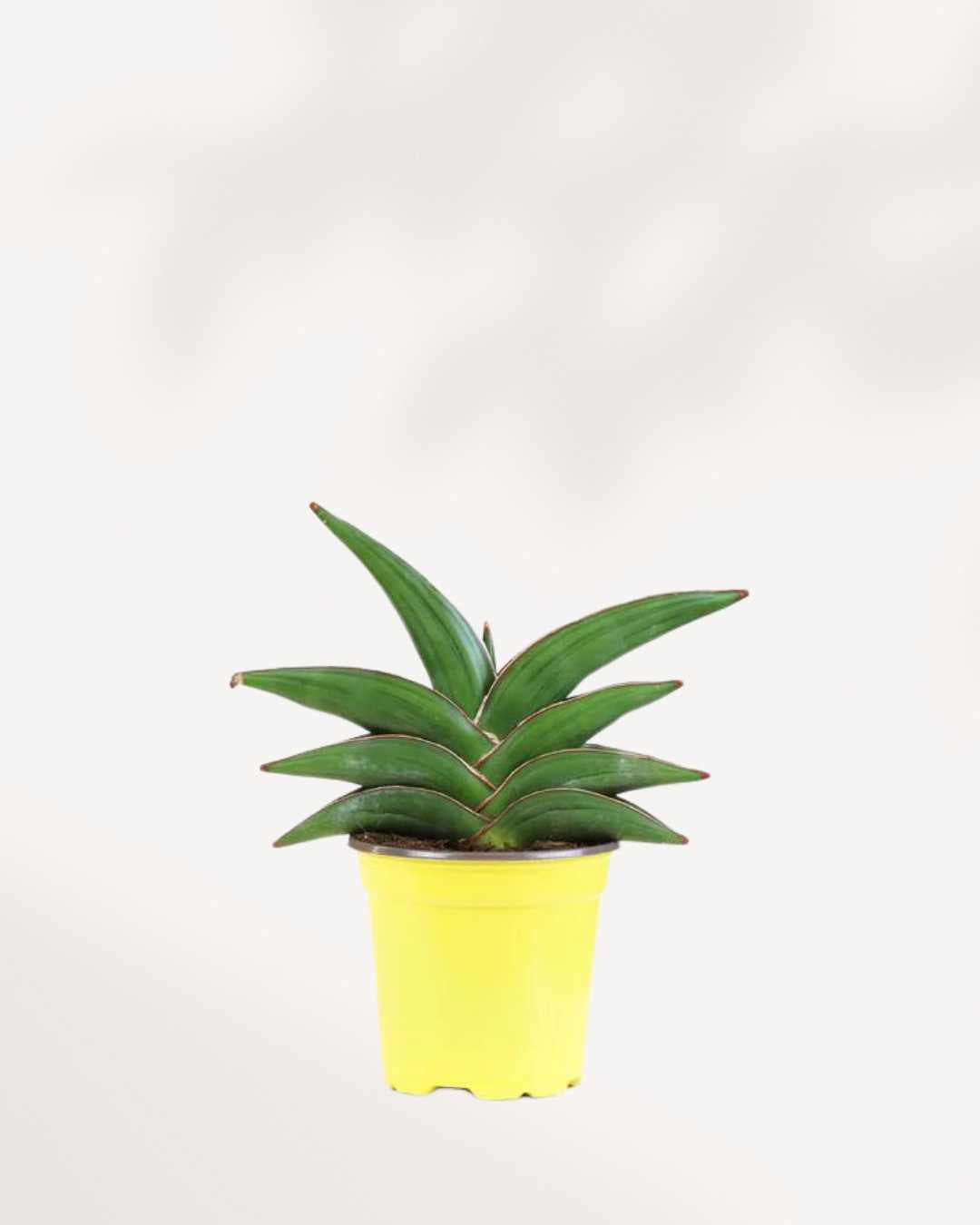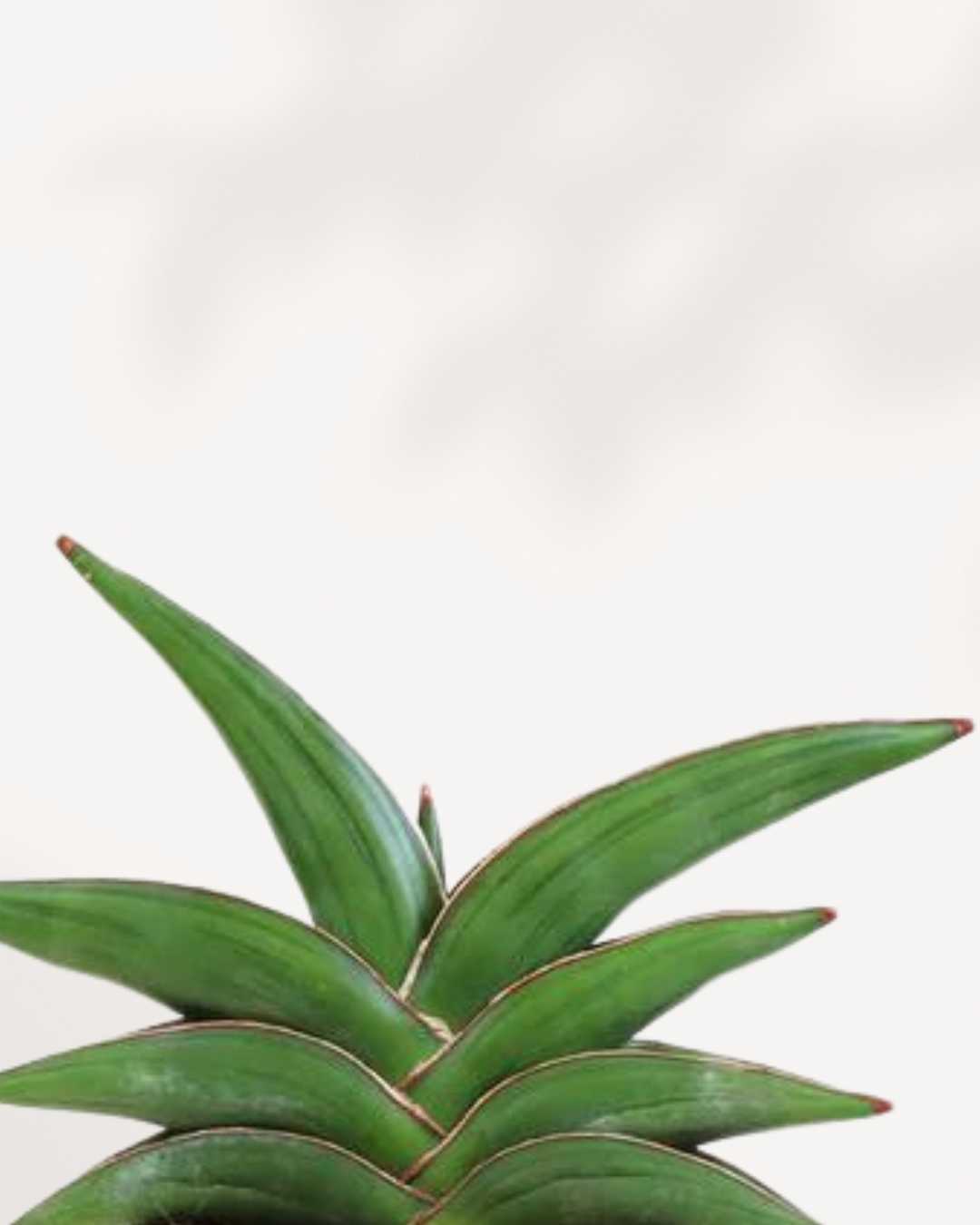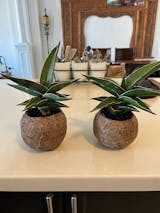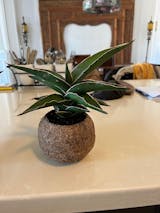Couldn't load pickup availability
Sansevieria Samurai, also known as the Dwarf Samurai Snake Plant, is a compact and striking succulent recognized for its layered, sword-like leaves that resemble the armor of a samurai warrior. Its architectural design and deep green foliage make it a standout addition to any indoor plant collection. With its hardy nature and minimal care requirements, this plant is perfect for beginners and seasoned plant enthusiasts alike.
Common Names
- Samurai Sansevieria
- Dwarf Samurai Snake Plant
- Sansevieria Ehrenbergii
Botanical Classification
- Kingdom: Plantae
- Order: Asparagales
- Family: Asparagaceae
- Genus: Dracaena (formerly Sansevieria)
- Species: Dracaena ehrenbergii
Native Habitat
Sansevieria Samurai is native to the arid regions of Africa and parts of Asia. It thrives in dry and rocky environments, making it exceptionally drought-tolerant. Its ability to withstand harsh conditions translates well to indoor spaces, where it can thrive with minimal care.
Historical and Cultural Significance
Named after the iconic samurai warriors of Japan, Sansevieria Samurai symbolizes strength and resilience. Its compact and robust structure has made it a favorite for modern and minimalist decor, often representing protection and endurance in various cultures.
Uses and Popularity
Sansevieria Samurai is highly valued as a decorative indoor plant due to its unique appearance and low maintenance needs. It’s an excellent choice for desks, shelves, and small spaces. Additionally, it’s well-known for its air-purifying properties, improving indoor air quality by removing toxins.
Conservation Status
Sansevieria Samurai is widely cultivated and not considered endangered. Its popularity ensures its availability in nurseries and garden centers around the world.
Description
Physical Characteristics
Sansevieria Samurai features compact, overlapping leaves that form a rosette pattern. Its dark green foliage is accented with reddish-brown edges, giving it a sleek and modern look. This plant grows slowly, reaching a height of about 6–12 inches, making it ideal for small spaces.
Growth Habit
This plant has a slow growth rate and maintains a compact size, making it perfect for tabletops, shelves, or window sills. Its upright, sword-like leaves provide a sculptural and architectural element to any space.
Popular Sansevieria Varieties
Sansevieria Laurentii
- Features bold yellow margins and deep green centers, perfect for statement decor.
Sansevieria Moonshine
- Known for its silvery-green leaves with a soft, luminous appearance.
Sansevieria Cylindrica
- Features tall, cylindrical leaves resembling fingers, offering a sculptural look.
Sansevieria Boncel (Starfish Sansevieria)
- Compact, fan-shaped growth resembling a starfish, perfect for small spaces.
Sansevieria Black Coral
- Striking dark green leaves with silver horizontal stripes for a bold look.
Care Guide
Light Requirements
Sansevieria Samurai thrives in low to bright indirect light. It can tolerate low-light conditions but grows best with brighter light exposure. Avoid prolonged direct sunlight, which may scorch the leaves. Plant Light Requirements
Watering Needs
Allow the soil to dry out completely between waterings. Overwatering can cause root rot, so water sparingly, especially during cooler months. Indoor Plant Watering
Soil Preferences
Use a well-draining cactus or succulent mix to ensure proper drainage. Adding sand or perlite can improve aeration and prevent water retention. Indoor Potting Mix
Humidity
This plant adapts well to low humidity, making it perfect for dry indoor spaces. No additional misting is required.
Temperature
Keep temperatures between 60°F to 85°F (16°C to 29°C). Protect from frost and cold drafts.
Common Pests
Spider Mites
Spider mites suck sap, leading to leaf discoloration. Maintain humidity and clean leaves regularly to prevent infestations. Learn More
Mealybugs
White, cotton-like insects often cluster at leaf bases. Remove them using rubbing alcohol or insecticidal soap. Learn More
FAQs
How tall does a Sansevieria Samurai grow?
It typically grows to about 6–12 inches, making it ideal for small spaces.
How often should I water my Sansevieria Samurai?
Water only when the soil is completely dry. Reduce watering during colder months.
Is Sansevieria Samurai safe for pets?
No, it is toxic to pets if ingested. Keep it out of reach of cats and dogs.
Can Sansevieria Samurai survive in low light?
Yes, it can tolerate low light but grows best in bright, indirect light.
Does Sansevieria Samurai purify air?
Yes, it effectively filters toxins like formaldehyde and benzene, improving indoor air quality.
How to take care of the Sansevieria Samurai
Sun: Indirect
Sun: Indirect
Light: Low
Light: Low
Water: When Fully dry
Water: When Fully dry
Humidity: Low
Humidity: Low
Pet Friendly: Caution
Pet Friendly: Caution
Pro Tip
Pro Tip
Delivery Policy for Plant Condition
Delivery Policy for Plant Condition
"I have only received part of my order. What to do?
No worries if you've only got part of your order! Our plants come from different nurseries and might arrive in separate shipments, typically 1-2 days apart. It's all part of ensuring your green friends reach you in top-notch condition!
If you do not receive the remaining packages within 48 hours contact support at info@mygreenscape.ca
What is the Life Time Support?
Absolutely! Lifetime support means you can count on us whenever you have questions or uncertainties about your plant. Whether you're puzzled by its behavior or just want to ensure it's thriving, we're here for you. Connect with us on Instagram @mygreenscapeto or shoot us an email at support@mygreenscape.ca.
When it comes to our guarantee for plants shipped with standard or express, rest assured that we offer a 30-day happy healthy plant guarantee on all such shipments. This ensures that your plants are covered for 30 days after delivery, giving you peace of mind regarding their condition. If you have any concerns within this period, feel free to reach out to us for assistance.
For further details, please visit our Local Delivery, Store Pickup, Standard Shipping Guide Page.
What to expect
What to expect
Your plant will arrive in a standard nursery pot, typically 0.5" - 1" smaller than the stated size to seamlessly fit into your chosen decorative pot. Washable Paper Planter Bags are available for separate purchase.
Just like nature intended, each plant is unique, showcasing natural variations in size, shape, and characteristics. Our commitment is to deliver a plant that closely resembles the one featured on our website, matching your chosen size, and with the potential to thrive happily in your home.
Frequently Asked Questions
Frequently Asked Questions
Certainly! If you're pondering about ordering plants online, you're not alone. We've compiled the most frequently asked questions. Check out our FAQ section here for quick answers! Happy planting!
Plant & Pot Size Chart
Plant & Pot Size Chart
Choosing the right pot size for your plants can be a daunting task, especially if you're new to gardening. But fear not! Our pot sizes chart can help you find the perfect match for your plants, ensuring they have enough space to grow and thrive. With our guide, you'll be able to confidently choose the right pot size and plant variety for your gardening needs.
Plant Pot Size Guide.

| Extra Small | 7-10 cm | 2.5 - 3 inches |
| Small | 11-12 cm | 3.5 - 4 inches |
| Medium | 14-17 cm | 5 - 6 inches |
| Large | 19-21 cm | 8 - 10 inches |
| Extra Large | 24-27 cm | 12 - 14 inches |
All sizes are specified in product details.
Your Complete Guide to Pot Sizes: What Size Should You Choose?

When selecting a pot for your plant, it's important to find the right size. But with all the different options out there, how do you know which one is best? We're here to help!
MyGreenscape's pot sizes chart is a great resource for finding your perfect fit. Our easy-to-read chart takes out all the guesswork and helps you quickly choose the right size for your plant.
Smaller pots are best for seedlings or small plants just starting out. These tend to be shallow but wide, allowing enough room for the roots of the young plant but not too much where they get overcrowded. Medium-sized pots are ideal when your plant has grown from its infancy and is ready for more space. These are deeper and wider than small pots, so that it can accommodate larger root systems - making sure your plant gets enough nourishment while still giving it breathing room. Large pots are top choice if you have an established plant in need of lots of space - think trees and large shrubs! The spacious depth and width allow plenty of room for deep root systems without struggling for air or light.
No matter what size you choose, MyGreenscape has got you covered, with our pot sizes chart guaranteeing you find the perfect fit every time!
Winter Shipping Protection
Winter Shipping Protection
We take extra care with each package during the colder months. For destinations experiencing cold weather, we provide insulated packaging and heat packs as needed to protect your plants from freezing temperatures. With Winter Shipping Protection, your plants are equipped to arrive safe and sound, even in winter’s chill.
Care Guide
Care Guide
Explore essential care tips. check out our Comprehensive Resource for Indoor Plant Care.


WATERING MADE EASY
Check soil moisture before watering and use a potting mix that drains well. It’s the secret to healthy, happy plants!
Hear From Happy Plant Parents.
Who have brought Mygreenscape plants into their homes.







